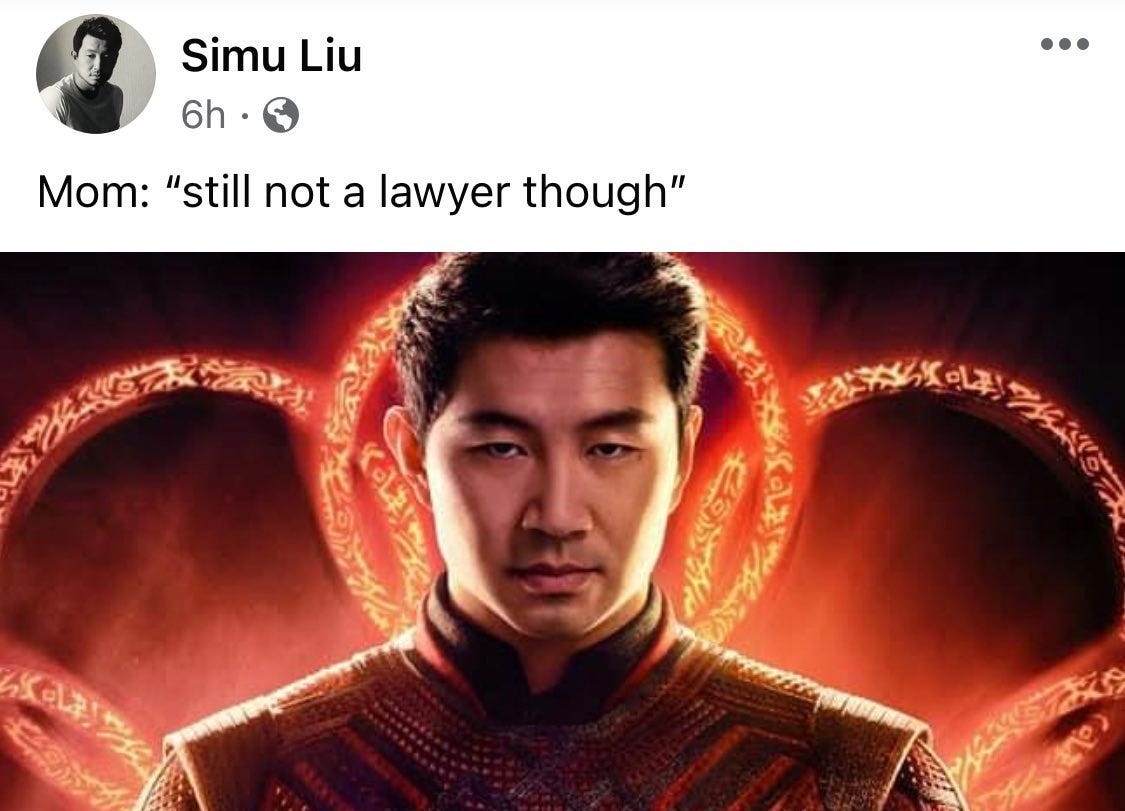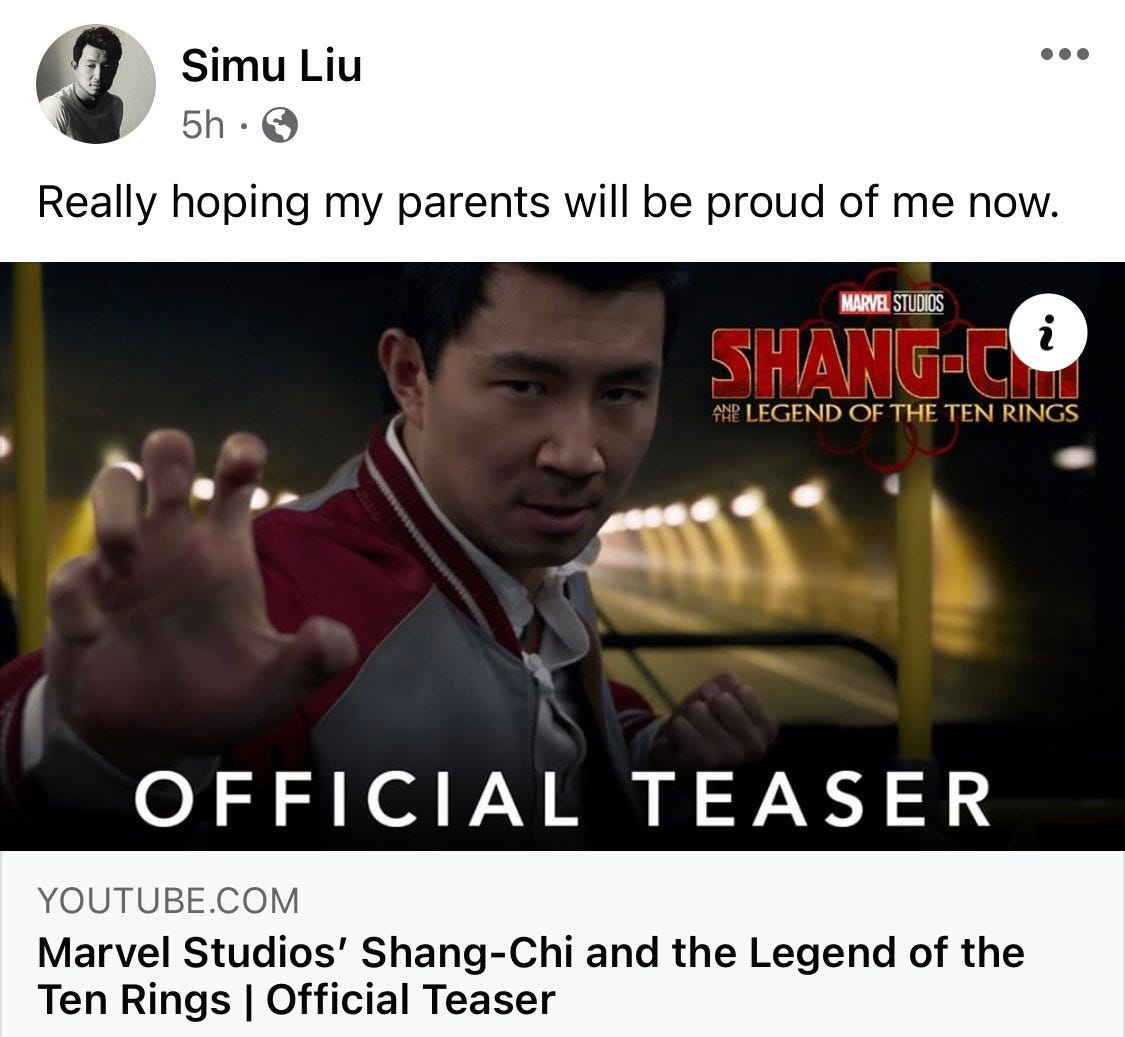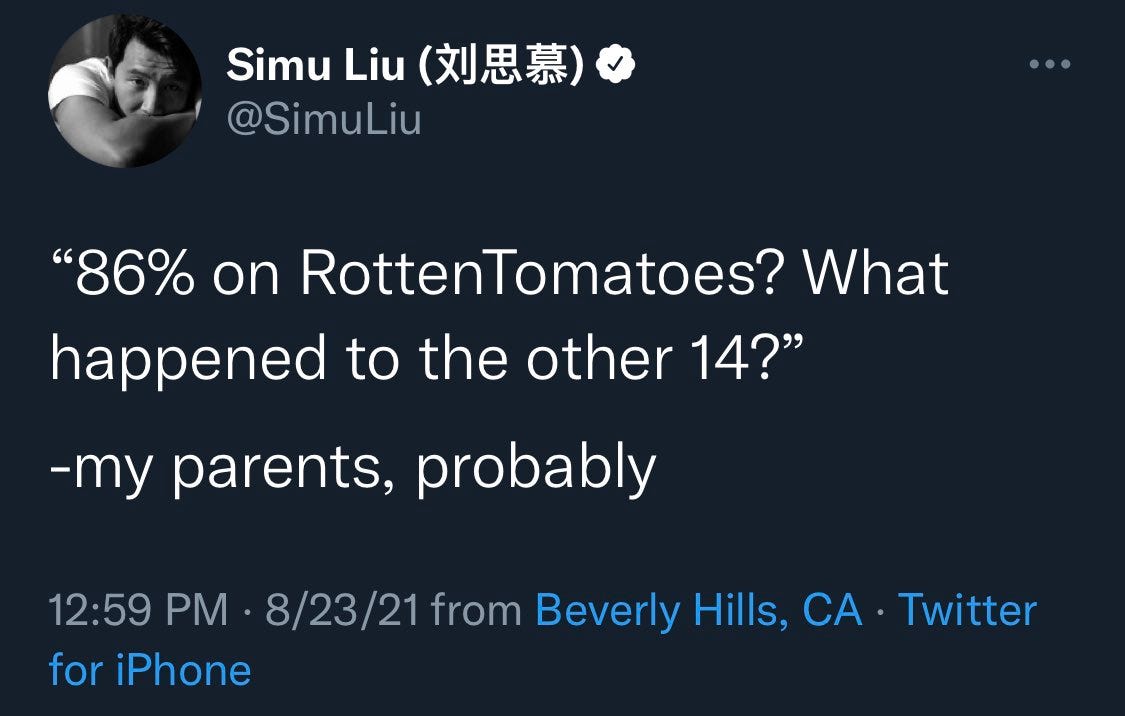On Simu Liu, Awkwafina, and Boba Liberalism
In case you didn’t know, Marvel Studios released their latest superhero film this past weekend, Shang-Chi and the Legend of the Ten Rings. As the studios’s first film featuring an Asian-lead and virtually all-Asian (er, Chinese) cast, it’s easy to be excited for it. But leading up to the premiere, it was honestly hard for me to get excited for the film—because its lead actors, Simu Liu and Awkwafina, are just so hard to root for.
Awkwafina is a Culture Vulture
I’ll start with Awkwafina, who portrays Katy, the best friend to lead character Shang-Chi (and is apparently Disney’s token funny Asian, from earlier this year’s Raya and the Last Dragon to the upcoming live-action remake of The Little Mermaid).
Awkwafina, aka Nora Lum, started her career as a rapper (hence the stage name “Awkwafina”), coasting off her use of a Blaccent, and became a Hollywood star due to said Blaccent (in 2018’s Crazy Rich Asians), before eventually tossing it away for her Golden Globe-winning performance in 2019’s The Farewell.
In a 2017 interview with Vice, the star said “I refuse to do [Asian] accents… Like that's annoying and I make it very clear, I don't ever go out for auditions where I feel like I'm making a minstrel out of our people.” It’s strange how she isn’t able to pay the same respects to the Black community. Some have come to Awkwafina’s defense, saying she grew up from a multicultural community, despite the fact that she grew up in Forest Hills, NY, a majority white and Asian population. And even if that were true, how come her new television series Awkwafina is Nora from Queens, which is supposedly based on her life, doesn’t feature any major Black characters? The star has never really addressed this controversy. The only thing I could find is from a 2018 interview, in which Awkwafina was asked about cultural appropriation allegations, and her response was an inadequate “I welcome that conversation because I think as an Asian American identity as a people, we're still trying to figure out what that is. So I welcome the conversation.” It’s the same cop-out response Jon M. Chu, director of Crazy Rich Asians, had earlier this year when asked about the lack of Afro-Latinos in his film adaptation of In the Heights. How about instead of saying “we should have this conversation” when someone is bringing up this conversation, you actually engage in said conversation?
Simu Liu’s Hypocrisy and Annoying Focus on Asian Representation
When it comes to my gripes with Simu Liu, the Chinese Canadian actor who portrays Shang-Chi, it’s, thankfully, not about him being a culture vulture, but rather his annoying focus on Asian representation.
Leading up to Shang-Chi’s premiere, Liu wrote many, many, many tired and stereotypically Asian posts on social media (see below). Like, too many for it to be funny. It’s the same problem 2020 Presidential candidate Andrew Yang had when he made Asian jokes at national debates—these jokes propped up the Model Minority Myth in their attempts to represent “all Asians,” when they’re really just representing East Asians. Just yesterday, he shared a photo of the film’s “A” Cinemascore rating in the Subtle Asian Traits Facebook group, and started the caption with “A on Cinemascore?? I’m really trying hard to not make the obvious joke here… lol.” Yeah, I know it must’ve been hard for you to hold back, Simu! But it’s also hypocritical because the actor once spoke about how he was against an Asian joke written for his character on the hit Korean Canadian show Kim’s Convenience. “I didn’t want audiences to see this character playing into that joke,” Liu said. His resistance halted production for an hour. “It was terrifying. I was on the verge of tears. It was actually a really, really tough day.” I guess he’s against cheap Asian jokes unless he’s the one making them.
Last month, Disney CEO Bob Chapek said “On Shang-Chi, we think it’s going to be an interesting experiment. It only has a 45-day window for us. The prospect of taking a Marvel title to the service after just 45 days would be an interesting data point...” To put it simply, he’s referring to their plans of releasing the film exclusively in theatres, before adding it to Disney+ just 45 days later. The “experiment” Chapek speaks of is not the film’s Asian-ness, it’s about the 45-day theatrical-then-streaming release model. But shortly after, an impassioned Liu tweets out “We are not an experiment. We are the underdog; the underestimated. We are the ceiling-breakers. We are the celebration of culture and joy that will persevere after an embattled year. We are the surprise. I’m fired the f**k up to make history on September 3rd; JOIN US.” It’s unclear if Liu intentionally misinterpreted Chapek’s comments or not, but it shows how deep his tunnel vision is, how he’s so eager to talk about the importance of representation in his film that he doesn’t realize Chapek’s comments weren’t about him at all.
Some may cheer on the fact that Liu is willing to basically subtweet his boss and endanger his career at Disney (which owns Marvel), but it’s less impressive when we remember how, as a rising actor, he spoke out against actor Mark Wahlberg for his racist beatings of Vietnamese American bystanders in the late 80s, but then deleted the tweet after being cast alongside Wahlberg in an upcoming film. “Let me get this straight, Mark Wahlberg beat a helpless man with a stick until he passed out when he was 16, and is attempting to get the courts to grant him an official pardon on the basis that he’s ‘turned his life around?’” Liu originally tweeted.
Liu is willing to give a pass for a violent and racist hate incident, but he draws the line at an apparent diss at Asian representation?
Late in Shang-Chi, a character tells Liu’s character that his life will never be the same from this point on. That line and that moment can also be directed at Liu. As a rising star whose biggest project, up until now, was a television series, becoming the lead of a new film for the most profitable franchise in film history is kind of a big deal. When Kim’s Convenience was cancelled earlier this year, Liu wrote in a since-deleted Facebook post claiming he and the other cast members were paid “an absolute horsepoop rate.” It’s safe to say this isn’t the case with Marvel. Liu’s life won’t be the same after this—this role will propel him to riches and more success. So I wish he could stop pretending he’s still the underdog.
It’s understandable why Liu would be so persistent with his excitement and passion for Marvel’s first Asian-led superhero film. I’m sure he’s genuinely having the time of his life! But his constant posts about the importance of representation in media, specifically his representation, comes off less earnest and more opportunistic. Liu deleting his tweet criticizing Mark Wahlberg was about his opportunity to appear alongside a major star like Wahlberg. Liu constantly posting about how important Shang-Chi is to Asian representation in media is about his opportunity to become a major star; it’s about how we need to show up for the film or else it will endanger Hollywood’s chances of ever making a film like this again, despite the fact that no Marvel film has ever failed (24 films in!). Also, we’re still in a freaking pandemic!
Boba Liberalism
Look, representation does matter. There is a lack of Asian American representation in film and television, in front of and behind the camera. On the importance of Asian representation, Stanford University staff psychologist Helen Hsu says “For Asians, it’s about seeing themselves as heroes or attractive. And for non-Asian Americans, it’s about relating to this person who in other media or even life has been seen as this dehumanized other.” But representation is not the most important thing, and this emphasis on it can be described as boba liberalism.
The term “Boba Liberalism” can be traced back to now-suspended Twitter user @diaspora_is_red, described as “a type of mainstream liberal Asian-American politics.” Like the drink, it’s all sugar, no substance—a “trend-chasing spectacle.”
“Boba Liberalism is thinking t-shirts, products, and merchandise are the main way of affirming one’s racial identity. It’s capitalist consumption presented as ‘API-ness’. Buy more crazy rich asians tickets, sell more boba, go to raves, wear this brand. It’s reliant on capitalism.”
Boba liberalism is the focus on superficial issues like representation, proximity to whiteness, with a largely East-Asian focus, while ignoring more important issues like Southeast Asian deportation. “That's one of those contradictions — where you see so many people clamoring for more mainstream acceptance of the AAPI community while ignoring and not talking about and not addressing these more harmful impacts and legacies,” says Mona Lee, a student at the University of California, Los Angeles.
Vox’s Senior Culture Reporter Alex Abad-Santos said it best regarding the attention to Shang-Chi’s success or lack thereof: “While I do think the movie is great and worth seeing, I’m far too cynical to believe that Shang-Chi’s box office success or Liu’s stardom will make my or any Asian person’s life ostensibly better.”
Who is Shang-Chi for?
Shang-Chi and the Legend of the Ten Rings, like any of Marvel Studios’s other offerings, is a good film. It’s a lot of fun, opens up a new world in the MCU, and it’s refreshing to see so many Asian faces when we’re used to seeing all-white casts. But if we really want to talk about representation, then we can’t ignore the fact that this is less an Asian American film than it is a Chinese American one. Literally all of the major Asian characters on screen are ethnically Chinese. The characters, their backgrounds, their names—they’re all Chinese. And that’s not a bad thing! Yesterday, Liu wrote in Subtle Asian Traits “It is a cultural moment for us as well, being the first movie in the MCU with virtually an entirely Asian cast.” Which begs the question, who is the “us” he’s referring to? The answer, like it almost always does in Asian America, is East Asians, specifically, Chinese Americans.








